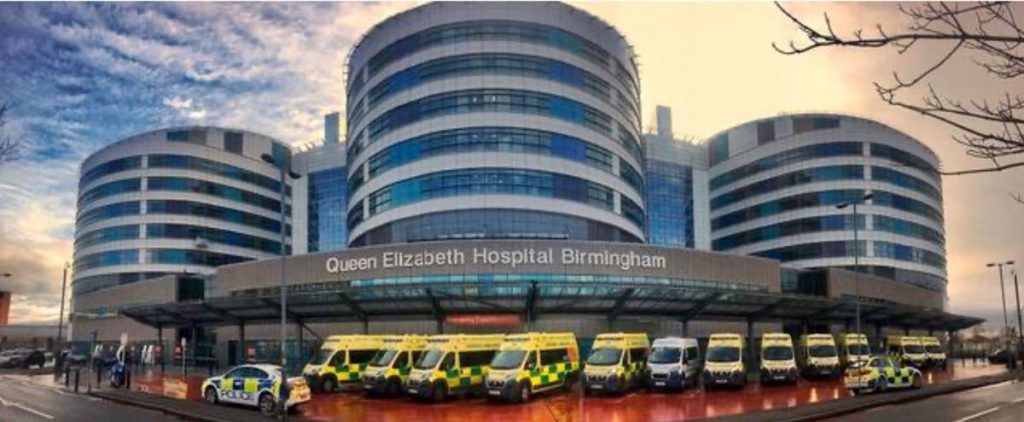Trini battles covid19 in Birmingham

Dr Muzzammil Ali, 30, is a TT national who works as a critical care doctor at the Queen Elizabeth Hospital in Birmingham, England, which is one of the biggest tertiary healthcare centres in the UK treating covid19 positive patients.
Newsday spoke with Ali on April 1 in a WhatsApp call.
Ali, originally from Westmoorings, has been living in the UK for 12 years. He studied medicine at the University of Birmingham. He’s been working at Queen Elizabeth Hospital for over three years.
The hospital had to adapt quickly to accommodate the surge of covid19 positive patients. Ali said the hospital’s administrators had been observing the impact of covid19 in Italy, France and London and knew it would only be a matter of time before it hit Birmingham.
The hospital has more than 1,200 beds for different medical specialities. In Ali’s critical care department, there are more than 100 beds.
“A lot of times when these people (covid19 patients) need hospitalisation…their breathing starts to deteriorate…They then need support with their breathing in the form of ventilation, so they need to be connected to a breathing machine.”
This is when patients are admitted to intensive or critical care. TT has a parallel healthcare system for covid19 patients. All covid19 positive patients are sent either to Couva and Caura hospitals for the duration of their illness, then transferred to alternative spaces when they recover until they have two negative tests for the coronavirus.
The Queen Elizabeth cancelled elective work such as elective surgeries and outpatient clinics, and revamped wards that were not previously equipped to deal with covid19 patients by installing monitors, ventilators and other equipment.
“We’re expecting quite a huge surge. If we look at the statistics from Italy, it has had in excess of 100,000 patients and we suspect in the next week or so we’re going to have more than 100 admissions requiring critical care.”
The hospital made changes to its workforce by reassigning nurses who were not previously critical care nurses to treat covid19 patients. They had to be trained to manage critically unwell patients with an experienced nurse or doctor monitoring them. Doctors from different departments were also transferred to work in critical care.
“This is where these patients ultimately end up. They need help with breathing, and that’s where most patients who are hospitalised may end up. It’s a dramatic change to hospital infrastructure and reinforcing dynamics, equipment and machinery.”
Ali said initially people considered covid19 a distant, overseas problem, but from the moment it became more evident in London, people started to take it seriously.
UK Prime Minister Boris Johnson, who has also recovered from the virus, closed leisure businesses such as certain shops, restaurants, pubs and gyms. People could only go outside to shop or exercise and were asked to keep two metres apart. Shops put tape on the ground for people to stand apart.
“I think social distancing, self-isolation and isolation, in general, is going to reduce the amount of admission we get to a hospital.
“The data suggests that if people are taking the right measures to stay at home, wash their hands, not go out and excessively self-isolating and social distancing, then the spread of the virus is limited and we shouldn’t expect that many admissions.”
Ali said doctors around the world don’t know how long the virus has been around or how many people have been in contact with it, as a lot of people are asymptomatic carriers who got the virus but have no symptoms. They can easily spread covid19. Even when people are self-isolating, they can spread it to their families.
“Even though people are taking the measures, we’re still expecting this surge because of the uncertainty of how long this virus has been around; the uncertainty of how many people already exposed; and the clinical trajectory, the way that people respond, it’s quite variable.”
Previously it was believed that the elderly with pre-existing health conditions were most vulnerable to covid19. However, as more people contract the disease, people outside that demographic are succumbing to it.
As Ali is working in a tertiary hospital, he is seeing these abnormalities first-hand.
“I think it still stands that people who are older, and people who have many other medical conditions like diabetes or breathing problems, they are at more risk.
“Now that does not mean that people who are younger are not at any risk, because I’m seeing 19-year-olds who get this are very sick with it, I’m seeing 30-year-olds who are very sick with it as well.

“This was quite a shock to all of us, because it was completely different from what we were being told.”
While exercise and diet play a huge role in one’s ability to fight off infection and bounce back from an illness, there’s much uncertainty about covid19.
Immunity is not only linked to diet and exercise but may depend on genetic potential to fight a condition. This is why people with a particular background may be at increased risk of heart attacks, strokes and diabetes.
“So people who have a certain type of genetic potential may, therefore, be at risk of getting covid19. But again we don’t know this yet. It’s all brand new. But I would advocate that people who have stronger immune systems would have more resilience in fighting this off.
“But people who are younger and are getting these infections may be disadvantaged for a reason that we haven’t yet identified, whether it’s a genetic reason or it’s a slight mutation in the virus or something that we haven’t even considered. It’s really hard to understand.”
While the critical care unit has been taking care of mostly covid19 patients, Ali has noticed an increase in people who have harmed themselves and damaged their organs by overdosing on medication or stabbing themselves. They may make themselves unconscious or have to be on a breathing machine.
Even though the number of admissions to the hospital dropped because people were told to stay home and manage their conditions, he saw an increase in the number of self-harm cases.
“There was an older gentleman who came to the hospital and he tried to end his life. They asked him after he was stabilised, ‘What was your reason for doing this?’ because he didn’t have mental health problems. And he said he did not like being alone with his thoughts.
“A lot of people, I think, because they’re in social isolation, they are being bombarded with these negative intrusive thoughts.”
Ali believes people are losing their motivation to do things because their daily routine is completely obstructed.
He wrote The Covid Companion – 52 Ways to be Happy in Isolation a book of tips people can use to practice self-care on themselves while in self-isolation. It is available on the Kindle Store.
While many people may be touch hungry, hugging, he said, releases oxytocin in both the hugger and the one who is hugged. Oxytocin is known as the cuddle hormone because it releases when two people bond socially helping them connect. Even bonding with an animal can produce oxytocin. Oxytocin facilitates trust between people, as anti-depressant like effects and influences a person’s fear and anxiety response by inhibiting the amygdala, the part of the brain responsible for the fight, flight or freeze response.
He said the brain does not know who is doing the hugging, so he suggests people hug themselves to help stimulate the oxytocin release.
Companies in the UK have offered medical personnel free food, support with childcare and hotel accommodations. The rideshare app Uber has given NHS staff free transport and meals.“A lot of a lot of companies and institutions and establishments have been very supportive.”
Some doctors have been put up in hotels while they care for covid19 patients because they fear bringing home the disease to their family.
“If you are concerned that you are working with covid19-positive patients and you don’t want to go home to your family because you risk spreading (it), then the hospital pays for a hotel fee to stay in the hotel. You get your meals sorted. They’ve been incredibly accommodating.
“They’ve gone all out, even at work. Everyday companies are delivering food to us saying, ‘Thank you for your hard work’…It’s quite nice to receive that sort of recognition.
Frontline medical workers are working around the clock to deal with covid19 patients. They are also an at-risk category for contracting covid19. This high stress can cause a strain on the doctors’ wellness.
When the doctors are seeing patients, they are dressed in protective gear that’s hot and uncomfortable.
The doctors devised a system to give each other breaks. Part of the hospital was rearranged to have a room where doctors could rest and people who are working in covid19-positive units are given free breakfast, lunch and dinner.
The Queen Elizabeth also has staff well-being services to talk to counsellors about stress, anxiety or any negative thoughts.
“They recognise that the workforce is going to be stressed and they’re going to be put under a lot of burden. By putting all these different things in place is helpful. But what’s more helpful is looking out for each other.”
He said a lot of people go through stressful situations outside work that their colleagues would not be aware of, and carry that stress to work.
“In this stressful environment, altogether they can compound and make people quite, quite stressed, quite anxious and quite sad. And unless we look out for each other, that would not work. We have to kind of be in this together.”


Comments
"Trini battles covid19 in Birmingham"